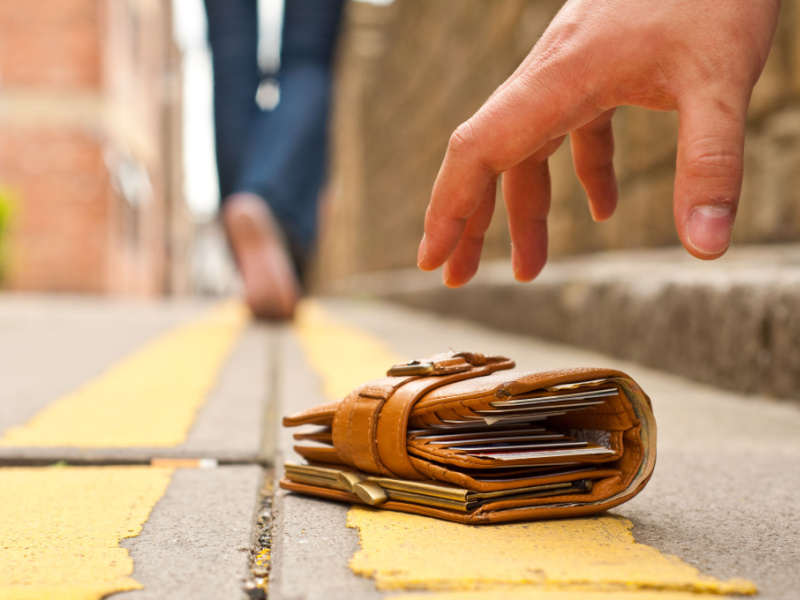Most people keep their whole lives in their wallet–credit cards, debit cards, drivers licenses, photos of loved ones, and sometimes even the keys to their homes. So losing your wallet can be one of the most stressful things that can happen to you. Knowing what to do when you’ve lost your wallet can help you feel more in control and less anxious.
Here are some tips regarding what you should do if you’ve lost your wallet.
6 things to do once you realize your wallet is missing

1. Retrace your steps
The first thing to do when you’ve realized you’ve lost your wallet is to retrace your steps. It’s possible you may still find it.
2. Cancel debit cards
If you cannot find your wallet even after you retraced your steps, you should then immediately cancel your debit cards. It is important to call your provider as quickly as possible, as the longer you wait the more likely you will be to be held responsible for illegal purchases. Most debit card providers will not charge you for fraudulent charges if you report your card missing or stolen within two days.
3. Cancel credit cards
Once you’ve canceled your debit cards, you should cancel your credit cards. Call your provider and let them know that your card has been lost or stolen. You’ll only be responsible for about $50 in illegal purchases. The credit card company will issue you a new card.
Here are the numbers of some of the biggest credit card companies:
- American Express: 1-800-992-3404
- Visa: 1-800-847-2911
- MasterCard: 1-800-627-8372
- Discover: 1-800-347-2683
4. Set up fraud alerts
Next, you should set up fraud alerts with the national credit bureaus. There are three national credit bureaus–Transunion, Experian, and Equifax–but you only have to contact one. The bureau you choose will contact the other ones. Then you should file a police report, even if you are not certain whether your wallet was stolen or just lost. Filing a report creates a paper trail that will help you in the event your wallet was stolen.
5. If you need one, get a new Social Security number
If you kept your Social Security card in your wallet, you should also contact the Social Security Administration to get a new social security number. This is good identity theft protection. Likewise, you should keep an eye on your credit reports just to make sure no one has been using your identity to apply for loans or credit.
6. Get a new driver’s license
Finally, if you have one, get a new driver’s license. It’s a pain, but it is illegal to drive without one, so it’s a necessity. Additionally, if you kept your house key in your wallet, it is also a good idea to change the locks to your home.
What to know about renters insurance and a stolen wallet

Unfortunately, renters insurance or homeowners insurance will not cover a lost item, especially if that item was lost due to carelessness. That includes lost wallets.
However, renters insurance and homeowners insurance do cover theft. So if your wallet is stolen, even if you are away from home, you’re eligible to file a claim.
Renters insurance also covers stolen cash, but only up to $200. Why? If renters insurers covered cash without limits, it would be way too tempting to claim someone stole $10,000 worth of cash, in hopes of getting a quick payday. On the other hand, if someone stole your backpack with your laptop, phone, and cash, you’d claim the cash along with the other items, and the deductible would be subtracted from the total value of your stolen stuff.
It’s also worth noting that if your wallet gets stolen and the thief uses your credit card, Lemonade renters insurance will cover any charges you’re held responsible for up to $500, and no deductible applies to this coverage.
You can read more here about renters insurance policies and theft.
7-step guide to filing a claim for a stolen wallet
Unfortunately, theft does happen. But if your wallet is stolen, you’ll be able to file a claim. Here’s how to do it.
1. Open the Lemonade app
First things first, open up the Lemonade app. Hit the button to file a claim on the top-right corner.
2. Answer questions from AI Jim
You’ll then have your identity verified by our AI Jim. He’ll also ask you more questions regarding what happened.
3. Sign Lemonade’s Pledge of Honor
Once AI Jim has gotten the information he needs, you will need to sign a digital Pledge of Honor, verifying that everything you say is truthful.
4. Describe the theft in a brief video
Then you will record a short video describing what happened. The video is completely confidential. It will only be used to review your claim.
5. Provide your police report.
Then you will be asked to scan and file your police report. A police report is required in order to file a claim. If you did not get a copy at the time you reported the theft to the police, most police departments have a way you can get a copy online via your local police website.
6. Prove your ownership
Next, AI Jim will ask you to list everything that was stolen, how much it was worth, and to provide proof of ownership. You can prove ownership by providing receipts or an online invoice. If you do not have a receipt, don’t worry, a team member will follow up with instructions as to how to include that item on your claim. Still, it is a good idea to keep receipts for items that are worth a lot of money.
7. Verify the details of your claim
Finally, you’ll be shown a summary of your claim so you can make sure that you didn’t make any mistakes, and you’ll be asked to enter your bank account information for any claims payouts.
FAQs
How can I track my lost wallet?
Although it won’t come in handy once your wallet has already been stolen, a Bluetooth wire tracker like a Tile Slim is a great way to protect your wallet from future theft. Your tracker is linked to an app, which you can immediately log into to access your wallet’s location.
How can I protect myself from identity theft after my wallet has been stolen?
After going through the moves of canceling your credit and debit cards and replacing your IDs if necessary, you should also make sure to change all of your passwords to secure your other accounts. And to protect yourself in the event of a future mishap, you should consider signing up for an identity theft protection program like LifeLock or IdentityIQ. These services will streamline the process of protecting your identity, helping you cancel or replace your credit and debit cards and replace your IDs after wallet theft.
If my wallet is stolen and used to commit identity theft, does renters insurance cover the expenses associated with resolving identity theft issues?
Yes, it generally does, with a few caveats. Renters insurance covers up to $500 in fees associated with unauthorized credit card use, with no required deductible. However, there are exceptions: if, for example, someone from your family steals your credit card and racks up the balance, your renters insurance would not reimburse you for those expenses. Your policy will also cover the costs of replacing IDs, like your driver’s license or passport, after your deductible.
Some final words of advice

Theft can happen anywhere, at any time, to anyone. Still, there are some things you can do to make sure that if your wallet is stolen it will be a slightly less stressful experience.
First of all, leave some contact information in your wallet–such as your name and phone number (but not your address)–so that if a good Samaritan picks up your wallet they can easily get it back to you.
Do not carry your Social Security card in your wallet. Store it someplace safe in your home. This can protect you from identity theft. Likewise, never ever store a list of passwords in your wallet. That’s just good common sense.
Only carry one or two credit cards or debit cards in your wallet. That way if your wallet is stolen, you will only need to call a few of your providers and not all of them.
Finally, never keep your house key in your wallet. Your address can be easily obtained on the internet, making it especially risky if your keys fall into the wrong hands. Keys belong on a key ring safely in your pocket or in a zipped compartment in your bag.
Hopefully, you will never have to experience a lost or stolen wallet. But if it does happen, know that there are things you can do and it doesn’t have to be a hassle. And if you get a Lemonade renters insurance policy, you’ll have the peace of mind of knowing that you’re covered for wallet theft, at home or anywhere in the world.
A few quick words, because we <3 our lawyers: This post is general in nature, and any statement in it doesn’t alter the terms, conditions, exclusions, or limitations of policies issued by Lemonade, which differ according to your state of residence. You’re encouraged to discuss your specific circumstances with your own professional advisors. The purpose of this post is merely to provide you with info and insights you can use to make such discussions more productive! Naturally, all comments by, or references to, third parties represent their own views, and Lemonade assumes no responsibility for them. Coverage and discounts may not be available in all states.




